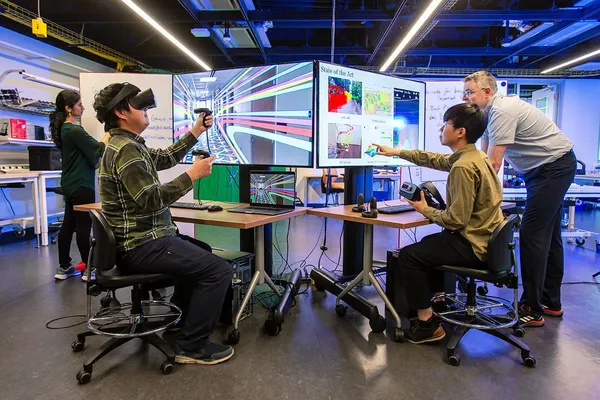Generative AI at UMD

What is Generative AI?
Generative AI (GAI) is a subset of artificial intelligence that focuses on producing novel content by learning patterns from training data. Unlike conventional AI used for specific tasks, generative AI employs complex algorithms, especially deep learning models like Generative Adversarial Networks (GANs) and Variational Autoencoders (VAEs), to create outputs resembling the training data.
The central concept is enabling machines to craft original outputs, such as lifelike images of nonexistent objects or unique music compositions, by learning from extensive datasets to grasp patterns. Once trained, the AI generates new data points that bear similarities to the original but are entirely innovative. This technology finds applications in art, creativity, drug discovery, and generating synthetic data for training other AI models, highlighting its broad potential impact across industries and its rapid evolution in the AI domain.
Thoughts on AI from Senior Leadership

Pines Says Higher Ed Institutions Should Consider the Technology’s Upsides Along With Risks
Op/ed: AI Has Potential to Solve Grand Challenges

Innovations in AI technology are bringing both productivity benefits and unpredictable pedagogical challenges to educational settings like ours.
The Use of Artificial Intelligence (AI) in UMD courses

UMD's CIO and CDO discuss how to protect the privacy of Student, Research, and Administrative data when using Generative AI
Using Generative AI While Respecting Privacy
Guidance for Students, Faculty, and Staff
General Guidance for Using GAI
Considerations in Choosing a Generative Artificial Intelligence (GAI) Tool:
Privacy risks: Be cautious as some tools might not guarantee data privacy and could be accessible by external parties. Avoid sharing sensitive information like credit card details or personal identifiers
Misleading costs: Some tools might appear free initially but might require a credit card for a trial, making it difficult to cancel the subscription later. Stay vigilant of such tactics
Learn to use: Familiarize yourself with tools like ChatGPT using available resources, such as training materials from UMD or comprehensive lists of prompts for different purposes
Understand limitations: Recognize the capabilities and constraints of GAI tools, as they are predictive models and not sentient beings. Explore information about their limitations to use them effectively
Use reputable resources: Ensure the tools you choose are from reliable companies like OpenAI's ChatGPT and DALL-E 2, Google's Bard, and Microsoft's Bing AI
Safe computing: Adhere to guidelines provided by DIT to remain safe on the internet
Considerations for the Ethics of Using GAI:
GAI is not sentient: These models don't possess self-awareness but are trained on datasets, leading to inherent biases and limitations
GAI is biased: Due to training on past data, these models may not account for current social changes and could have implicit biases
GAI can mislead: Models might produce information that lacks veracity, relying on verbosity rather than actual evidence
GAI prefers English: Language models can be biased towards Standard American English, disadvantaging other dialects and writing style
Student Guidance for Using GAI
How to Use GAI Responsibly in Academic Settings:
Seek guidance from professors on appropriate use in coursework
Verify information and citations from GAI and supplement with independent research
Remember that GAI tools are only tools and shouldn't replace critical thinking
Ask yourself relevant questions regarding your usage of GAI, its impact on your learning, content accuracy, and its equitable use compared to peers. Use these tools ethically to contribute positively to society
Staff Guidance for Using GAI
As GAI presents transformative possibilities for higher education and beyond, consider the following questions regarding your usage:
Is the GAI-based tool aiding my learning and cognitive processes?
Is the GAI-based tool enhancing or hindering my job performance?
Is the content I generate accurate, verifiable and free from biases that may harm others?
How will I handle content generated by GAI-based tools?
How can my use of GAI-based tools contribute to the greater good of society?
Remember the ethical responsibility associated with using GAI-based tools, as they can impact both personal growth and societal well-being.
Resources

Faculty

President Pines: AI Has Potential to Solve Grand Challenges
Provost Rice: The Use of Artificial Intelligence (AI) in UMD courses
UMD Statements on AI

General Resources